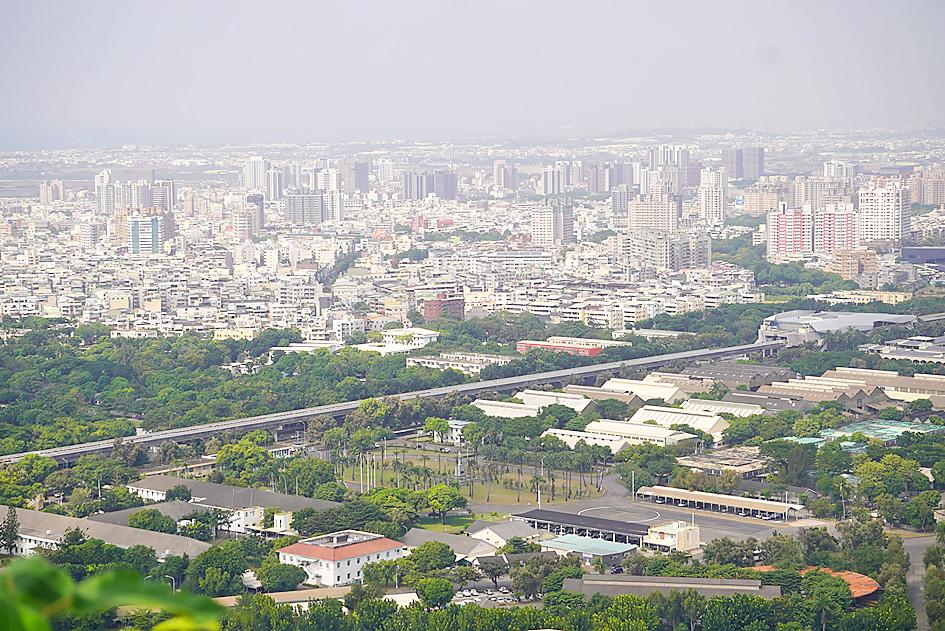Housing transactions in the six special municipalities fell 11.2 percent sequentially last month to 22,439 units, as buyers turned more cautious amid higher interest rates and unfavorable government policies, real-estate brokers said on Monday.
The figure represented a 0.9 percent increase compared with the same period last year, based on data compiled by the six local governments.
Taipei, Taoyuan, Tainan and Kaohsiung all reported double-percentage declines to 2,747, 3,687, 1,933 and 3,389 units respectively last month, when the Tomb Sweeping Day holiday cut working days by three, Sinyi Realty Inc (信義房屋) research manager Tseng Ching-der (曾敬德) said in a press release.

Photo: CNA
An interest rate hike of 0.25 percentage points in March and the Executive Yuan’s approval of a proposal to heavily fine “dishonest marketing practices” affected sentiment, Tseng said.
The central bank on March 17 raised interest rates by 25 basis points and is widely believed to be planning further tightening measures like its peers around the world to combat inflation.
Consumer prices have climbed above the 2 percent alert level for seven straight months and might not come down until the second half of the year, the Directorate-General of Budget, Accounting and Statistics has said.
Property transfers in New Taipei City were relatively resilient, posting a 5 percent decline to 6,113 units, Tseng said, adding that Taichung posted an 8 percent fall to 4,570 units.
Tseng voiced concern that the market would worsen this month, as people avoid going out after daily COVID-19 cases hit more than 20,000 yesterday.
A recovery is unlikely until the infection numbers stabilize, he said.
Health authorities have forecast that millions of Taiwanese would be infected before the outbreak can be brought under control, likely in the middle of next month.
In the first four months of the year, housing transactions in the six special municipalities hit a nine-year high of 87,360 units, up 3.2 percent from a year earlier, data showed.
That was led by increases of 5.3 percent in New Taipei City, 4.9 percent in Taichung, 4.6 percent in Tainan and 2.8 percent in Kaohsiung, the data showed.
Taipei reported a minimal increase of 0.4 percent but Taoyuan saw a 0.3 percent decrease, the data showed.

Sweeping policy changes under US Secretary of Health and Human Services Robert F. Kennedy Jr are having a chilling effect on vaccine makers as anti-vaccine rhetoric has turned into concrete changes in inoculation schedules and recommendations, investors and executives said. The administration of US President Donald Trump has in the past year upended vaccine recommendations, with the country last month ending its longstanding guidance that all children receive inoculations against flu, hepatitis A and other diseases. The unprecedented changes have led to diminished vaccine usage, hurt the investment case for some biotechs, and created a drag that would likely dent revenues and

Global semiconductor stocks advanced yesterday, as comments by Nvidia Corp chief executive officer Jensen Huang (黃仁勳) at Davos, Switzerland, helped reinforce investor enthusiasm for artificial intelligence (AI). Samsung Electronics Co gained as much as 5 percent to an all-time high, helping drive South Korea’s benchmark KOSPI above 5,000 for the first time. That came after the Philadelphia Semiconductor Index rose more than 3 percent to a fresh record on Wednesday, with a boost from Nvidia. The gains came amid broad risk-on trade after US President Donald Trump withdrew his threat of tariffs on some European nations over backing for Greenland. Huang further

CULPRITS: Factors that affected the slip included falling global crude oil prices, wait-and-see consumer attitudes due to US tariffs and a different Lunar New Year holiday schedule Taiwan’s retail sales ended a nine-year growth streak last year, slipping 0.2 percent from a year earlier as uncertainty over US tariff policies affected demand for durable goods, data released on Friday by the Ministry of Economic Affairs showed. Last year’s retail sales totaled NT$4.84 trillion (US$153.27 billion), down about NT$9.5 billion, or 0.2 percent, from 2024. Despite the decline, the figure was still the second-highest annual sales total on record. Ministry statistics department deputy head Chen Yu-fang (陳玉芳) said sales of cars, motorcycles and related products, which accounted for 17.4 percent of total retail rales last year, fell NT$68.1 billion, or

HSBC Bank Taiwan Ltd (匯豐台灣商銀) and the Taiwan High Prosecutors Office recently signed a memorandum of understanding (MOU) to enhance cooperation on the suspicious transaction analysis mechanism. This landmark agreement makes HSBC the first foreign bank in Taiwan to establish such a partnership with the High Prosecutors Office, underscoring its commitment to active anti-fraud initiatives, financial inclusion, and the “Treating Customers Fairly” principle. Through this deep public-private collaboration, both parties aim to co-create a secure financial ecosystem via early warning detection and precise fraud prevention technologies. At the signing ceremony, HSBC Taiwan CEO and head of banking Adam Chen (陳志堅)